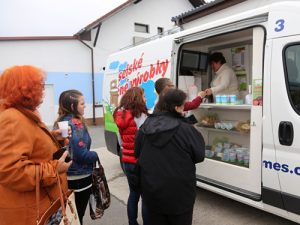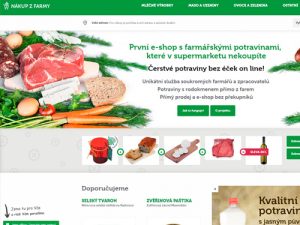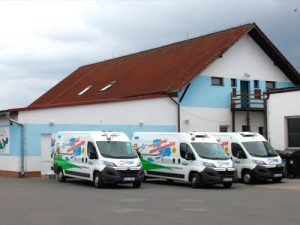This project brings together twenty Czech private farmers and is led by two farmers, Němec and Miller, who started the project in 2010. Němec Family Farm processes milk that is produced by neighbouring dairy farms (including the Miller family farm). Most of their produce is sold through a delivery service called ‘Milk from the Farm’, and in 2016 the project was extended to a mobile farm marketplace for lots of different types of produce.
Area: Němec family farm - 850 hectares. Miller family farm - 630 hectares. Other 20 farmers (no relevant data)
Němec Family Farm was established in 1990 on 22 hectares of farmland. Nowadays, it is made up of about 850 hectares which are dedicated to crop production (cereals, rapeseed, sugar beet etc.). In the beginning, the farm also produced milk but in 1994 the business was changed when the family set up an on-site dairy and stopped milking cows on their own farm. Every day, around 6,000 liters of milk is processed into 15 different types of milk products. The Miller Family Farm was established in 1992 and specializes in crop and milk production. The farm has approxi- mately 250 cows, of which 100 are milked daily.
Up until 2010, the Němec on-farm dairy was focused only on the production of “Balkan” cheese, producing approxi- mately 40 - 50 tonnes every month for a company called Madeta, which is the dominant milk processor in Czechia. In 2011, a huge economic downturn affected the milk sector and Madeta stopped buying their product overnight.
Therefore, the strategy had to be changed radically to find new ways to sell their cheese. The assortment of products was extended and the concept of selling directly to the consumer was launched through the new service “Milk from the Farm”: a cooperation project between two farmers and friends, Mr. Němec and Mr. Miller. Milk would be produced on the Miller’s farm under strict veterinary controls and processed in the Němec family’s on-farm dairy. Products are sold directly by delivery vans, which serve around 15,000 customers at 1,700 stations every week. Each of the two farmers operates one half of the selling locations. In the beginning, they enjoyed enormous success and long queues were a regular occurrence. Interest is a little bit lower today, but the business is still profitable.
Several consumers asked about the possibility of buying other farm products and this acted as an incentive to widen the assortment of products that the delivery service stocks. This also led to the establishment of an e-shop in 2016. Today, the number of partners who sell their products through the delivery service is around 22 (depending on the season). These include farmers, bakeries, wineries, and small family breweries. All of them are Czech-based and they focus on producing in a way that adheres to top-quality production standards relating to animal welfare. All products have a traceable place of origin and spend as little as time as possible in transit. This is a significant difference between the farmers involved in this project and those who may just be reselling other farmer’s products from small or private farms.
The distribution is operated by 16 people, with Tomáš Němec, the original farmer’s son, as a Managing Director. They operate in an area of approximately 100 kilometers around Prague. The e-shop, all delivery vans, and distribution is managed by Němec Jr. together with one administrative employee. The new dairy herd and delivery vans are common investments by both farmers. All the dairy products are made solely from the milk of Jersey cows, with a fat content of 4,5 %.
Advice/Recommendation
"At the very beginning, we made a bad choice in picking our e-shop website provider which brought a huge delay to the launch of our project.
I would start with a much wider assortment from the beginning – not only 3 products - milk, cheeses and yogurts.
We would recommend to sign a contract at the very beginning of cooperation, even if you know your business partner very well and you have good experience from previous cooperation. Some issues can then be modified later with the approval of both sides. It is the best insurance against financial loss and a qualified lawyer should draw up the contract. Our previous smaller project, based on verbal agreement, failed – even though it was with a member of our extended family. 
We had a bad experience with large supermarkets. The prices that were dictated were unfeasible.
All farmers joined their efforts to distribute high quality products. They are free from cutting outrageous margins with external distributors and multinational food companies. They have all their own products under their control, but they must pay particular attention to paperwork and meetings and it very different to being a full-time farmer. EU subsidies are not used in their business and are not addressed for this type of agricultural business. At the moment, key investments are directed towards developing a company car fleet and the technology in the dairy. Their cooperation brings job satisfaction, a readiness to enhance output, desire to do things well, and is good for their farm businesses. Their aim is to continually improve the quality of their cooperation in order to ensure that the results will be appreciated by the consumer."
Queries/Questions
- Do you think that using a delivery service directly managed by the farmers could be an option to raise the profitability of the operation? Applying innovative distribution channels to your context could be feasible? If yes, what would be the main challenges?
- Differentiating the business activities could be a solution to overcome crisis. Do you foresee a differentiation of the business to anticipate possible crises? Reflect about the possible possibilities of business differentiation in your context.



 Čeština
Čeština  English
English  Français
Français  Deutsch
Deutsch  Italiano
Italiano  Slovenščina
Slovenščina  Español
Español 




